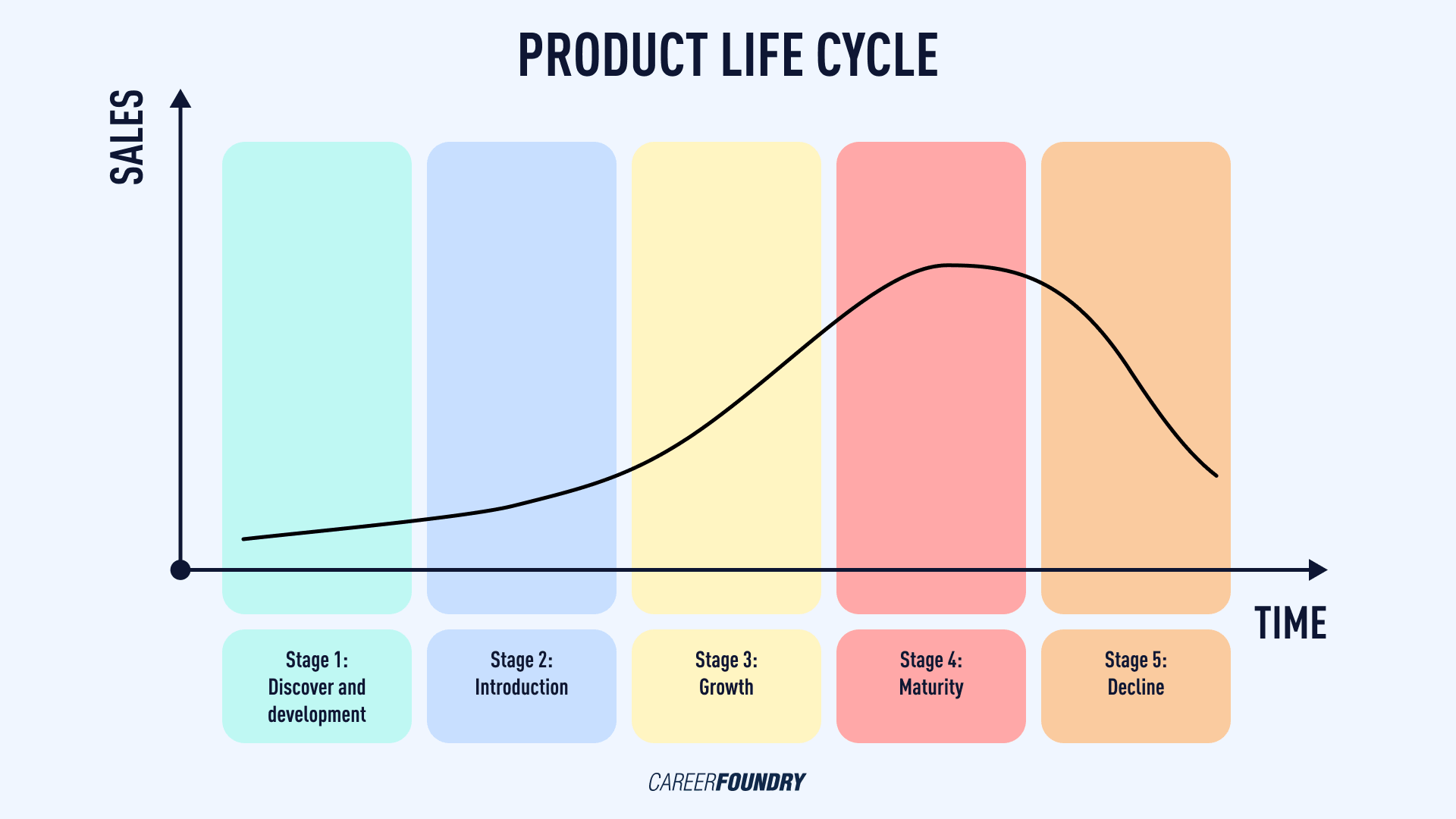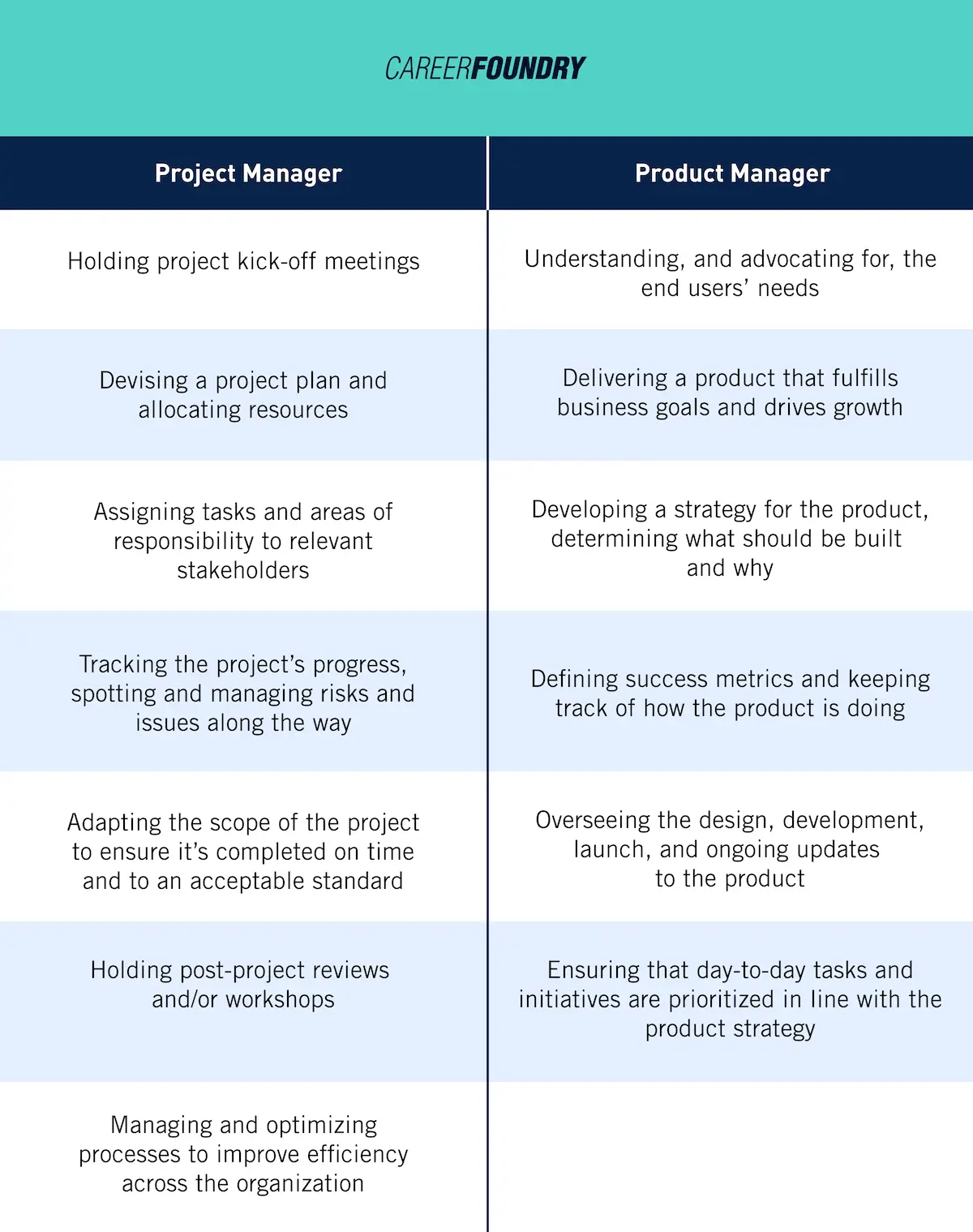Product manager and project manager: Two job titles that sound very similar and are often used interchangeably.
But are they the same thing? We clear up the product manager vs. project manager conundrum in this guide.
It’s easy to get the roles of product manager and project manager confused. Not only do the terms sound almost identical; there’s also lots of unclarity within the world of business around what each role entails and how they differ.
But they are indeed two different roles, as will become clear when we explore the day-to-day tasks and responsibilities of each.
We’ve broken our guide down as follows:
- What’s the difference between a product manager and a project manager?
- What does a product manager do?
- What does a project manager do?
- Who earns more, product managers or project managers?
- Product manager vs. project manager: The differences in summary
- Can a project manager become a product manager?
So: What exactly is the difference between a product manager and a project manager? Let’s find out.
1. What’s the difference between a product manager and a project manager?
The simplest way to distinguish between the two roles is to consider the “product” and “project” components of each job title.
Product managers are responsible for a specific product. In this context, “product” encompasses anything that’s created to meet the needs of a particular user group—be it accounting software for freelancers, a dating app, a dog grooming service, or a physical product like shoes or smartphones.
A product manager guides the product through the entire product life cycle, from discovering the initial idea to identifying product requirements, overseeing product development, launching the product, and maintaining its success on the market.

Essentially, product management is an ongoing endeavor, with no fixed end date.
Project managers are responsible for managing projects. By definition, a project is a series of tasks that need to be completed in order to achieve a certain outcome. Projects have a defined beginning and end, and they usually have a certain amount of time, resources, and budget allocated to them.
Project managers may work on projects that contribute to the product, but they’re not responsible for its overall success. As long as their individual projects are completed on time and within budget, the project manager can consider their job fulfilled.
That’s a surface-level distinction between product managers and project managers. We’ll explore how the roles differ in terms of day-to-day tasks and responsibilities in the following sections—starting with a closer look at the role of the product manager.
2. What does a product manager do?
As we’ve established, product managers are responsible for the success of a specific product. They guide the product through its entire life cycle, with the goal of making sure that it meets user needs and drives growth for the business.
Product managers take on a strategic role, defining an overarching vision for the product. They determine what needs to be built and why, conducting research and seeking to understand the target users’ requirements.
They develop and manage the product roadmap (a strategic document which maps out the direction of the product over time) and define success metrics.
With the product vision in place, product managers collaborate with different stakeholders to guide the design, development, launch, marketing, and maintenance of the product.
They connect and align all the various moving parts to ensure that the product is heading in the right direction.
The product manager role in summary
Product managers are often described as the CEO of the product. In a nutshell, they are responsible for:
- Understanding, and advocating for, the end users’ needs
- Delivering a product that fulfills business goals and drives growth
- Developing a strategy for the product, determining what should be built and why
- Defining success metrics and keeping track of how the product is doing
- Overseeing the design, development, launch, and ongoing updates to the product (it’s a highly collaborative role!)
- Ensuring that day-to-day tasks and initiatives are prioritized in line with the product strategy
For an even deeper dive into what the role entails, check out our dedicated guide: What Does a Product Manager Do?
3. What does a project manager do?
We know that project managers are responsible for the timely completion of specific projects. But what does that actually mean in terms of day-to-day tasks and responsibilities?
Remember how product managers are responsible for guiding the product through the entire product life cycle? Well, project managers are responsible for taking individual projects through what’s known as the project life cycle.
The project life cycle can be divided into five key phases:
- Project initiation: What needs to be done and why? This is sometimes referred to as the project kick-off. In this phase, the project manager sets out to define the goal of the project, to scope out high-level deliverables, to identify relevant project stakeholders, to align expectations, and to gauge what resources are available.
- Planning: How will it be done? During the planning phase, the project manager works closely with relevant stakeholders to devise a plan for how the project will be carried out. This includes outlining key steps that need to be taken in order to achieve the desired outcomes, and creating an overview of cost and timelines.
- Execution: With the project plan in place, different tasks are assigned to the relevant stakeholders and the project is officially underway! During the execution phase, the project manager guides the project team to ensure everybody’s on track and working towards the overall project goal.
- Monitoring and controlling: Ultimately, project managers are responsible for ensuring that a project is completed on time and within scope. So, a crucial part of the role is keeping track of the project’s progress and making sure that everything’s going according to plan. And, if it isn’t, the project manager must figure out solutions.
During the monitoring and controlling phase, the project manager captures and reviews data to track the project’s actual progress against the original plan.
- Closing: Once the project is complete, it’s important to review how the project went and to identify areas of improvement for next time. This step should be done collaboratively, ideally in the form of a post-project workshop. When closing the project, the project manager will also hand over all necessary deliverables and documentation to the relevant stakeholders.
The project manager role in summary
Depending on what stage the project is in, project managers will find themselves:
- Holding project kick-off meetings
- Devising a project plan and allocating resources
- Assigning tasks and areas of responsibility to relevant stakeholders
- Tracking the project’s progress, spotting and managing risks and issues along the way
- Adapting the scope of the project to ensure it’s completed on time and to an acceptable standard
- Holding post-project reviews and/or workshops
- Managing and optimizing processes to improve efficiency across the organization
As you can see, it’s a collaborative role which requires exceptional organizational, communication, and problem-solving skills (to name just a few!)
4. Who earns more, product managers or project managers?
Whether you’re looking to hire a product manager and/or a project manager, or you’re considering your own career, you may be wondering if there’s a difference in salary.
So who earns more, product managers or project managers?
In the United States, the average salary for a product manager is about $90,000. The average project manager salary comes in at about $76,000.
Glassdoor, meanwhile, reports a national average product manager salary of $113,000 vs. an average project manager salary of just over $73,000.
Based on these figures, it’s fair to say that product managers have higher earning potential than project managers. But, as you weigh up salaries, remember to factor in things like location, seniority level, and industry.
You’ll find more detailed salary data for different locations and industries in our dedicated product manager salary guide.
5. Product manager vs. project manager: The differences in summary
By now, you hopefully have a much clearer idea of how the product manager and project manager roles differ. To summarize, here are the key differences at a glance:

Now, let’s take a look at some of those differences in more detail:
- Product managers own a given product or service, guiding it through the product life cycle. It’s an ongoing endeavor, with no fixed end date. Project managers are responsible for individual projects which have a clear beginning and end.
- For a product manager, the goal is to ensure the product is successful in meeting the user’s needs and driving business growth. They work to improve the product over time in relation to certain KPIs and success metrics. For a project manager, the goal is to ensure that each project they manage is completed on time, within budget, and according to the project scope.
- Product managers take on a strategic role, devising an overarching vision for the product, setting out product requirements, defining success metrics, and overseeing the development, launch, maintenance, and improvement of the product. They generally take a big-picture view.
- Project managers guide individual projects through the project life cycle, defining the scope of the project, developing a project plan, delegating tasks to relevant stakeholders, and monitoring the project’s progress. Project managers are closer to individual tasks and processes than product managers.
- Data suggests that product managers typically earn more than project managers. In the United States, the average salary for a product manager is between $90,000 and $113,000, while the average project manager salary is around $73-76,000.
Those are the main differences between the two roles. But, while product managers and project managers both have very different goals, responsibilities, and day-to-day tasks, there are also some clear similarities.
Both product managers and project managers work collaboratively with different stakeholders to keep everybody aligned and moving towards a common goal, and they both work against clearly defined success metrics.
As such, both product managers and project managers rely on excellent communication skills, business- and data smarts, a natural knack for organization, and the ability to spin many plates.
So, if you’re a project manager looking to become a product manager (or vice versa) the leap might not be as far-fetched as you think. Which brings us to our final section: Can project managers become product managers?
6. Can a project manager become a product manager?
If you’re a project manager with your sights set on a more strategic role, you might consider moving into product management. But is it possible?
The short answer is yes—project managers absolutely can (and often do) become product managers.
As we’ve seen when comparing the two roles, there’s considerable overlap in terms of the skills required. So, as you make the transition into product management, you’ll find that you’ve already got some of the necessary know-how.
The real learning curve comes with shifting your approach away from project-based, task-level thinking (as is the norm for project managers) and adopting a higher-level, bigger-picture mindset.
At the same time, you’ll need to step back from closely managing internal resources and instead develop your expertise in understanding the market, getting a handle on business goals and, perhaps most importantly, gathering and understanding end user needs. Of course, you’ll also need to master the most important product management tools.
Still, the transition from project management to product management isn’t unthinkable—nor is it that unusual. Many project managers naturally become product managers as their role and responsibilities evolve (like product manager Joelle Fung, who writes about their move from project to product management in this Medium article).
Your route into product management will depend on your existing skillset and professional experience. If you’re working at a company that could facilitate an internal transfer, discuss your aspirations with your manager to see if you can set the wheels in motion.
Alternatively, consider taking a product management course to ensure you’re well-versed in all the most important skills, tools, and processes that employers will be looking for when hiring a product manager.
Still undecided? Dip your toe in with a free introductory product management course. It’ll take you less than a week, you can work through it at your own pace, and you’ll finish with an idea of whether or not product management is really for you.
What next?
That concludes our product manager vs. project manager comparison. If you’re keen to continue your exploration of product management, we can recommend the following guides:
